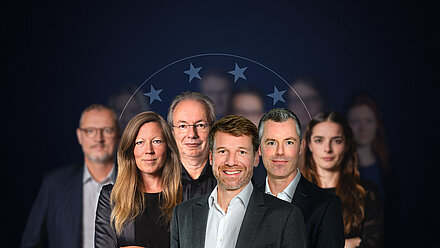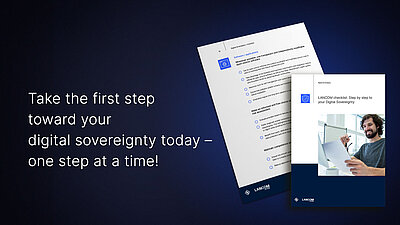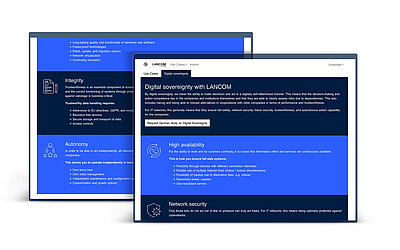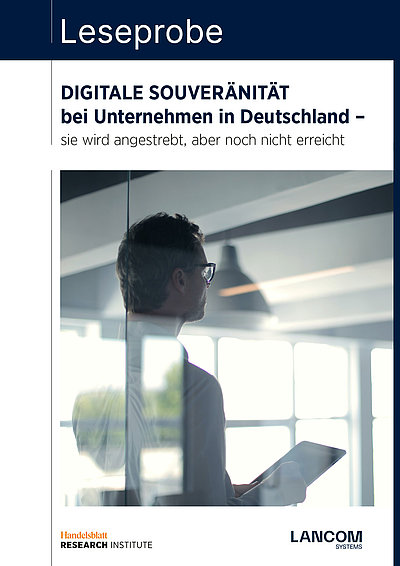When looking for a definition of the term “digital sovereignty”, the related terms digital autonomy, digital independence, and digital competence usually also come up. These terms refer to both mental and physical abilities, as well as external prerequisites for being able to act independently, enlightened, and confidently in the digital world.
Digital sovereignty can therefore be defined as digital empowerment: Individuals, companies, and institutions are enabled to operate independently and securely in the digital world and the associated technological landscape.
On the one hand, this requires a powerful, resilient, and trustworthy IT infrastructure, the control and functionality of which is in the hands of the companies themselves wherever possible. On the other hand, users need sufficient decision-making and action competence as well as the ability to assess the risk of dependencies and avoid them if necessary.
Digital sovereignty is only possible if freely selectable alternatives exist and are known when choosing network technology. This gives users the proficiency and ability to participate in digitalization in a self-determined and protected manner at all times.

We want to strengthen digital sovereignty in Europe together!
As CEO of the only German IT network manufacturer, I would like to emphasize the importance of a digital ecosystem that can be operated securely and autonomously. The past few years in particular have been characterized by uncertainty and disruption, and have made many companies aware of how dependent our economy is on global supply and value chains. That is why we must see it as our task to work on a more sovereign Europe, especially in the field of key technological sectors.
Ralf Koenzen
Founder LANCOM Systems
Why digital sovereignty?
Digital sovereignty as a strategic-political task to strengthen competencies
In recent years, many companies have become increasingly aware of just how desirable digital sovereignty really is. Component shortages, supply bottlenecks, and geopolitical circumstances have shown that excessive dependence on non-European manufacturers can be very restrictive and economically damaging.
For this reason, LANCOM sees the promotion and safeguarding of digital sovereignty not only as a strategic and political task, but also as a duty of the technology industry. German and European technical expertise and cooperation must be strengthened. This is the only way we can consolidate our position in technological areas and act responsibly.
There is a particular need for action in key digital technologies such as network technologies, microelectronics, security technologies, quantum technologies, etc.
For LANCOM Systems, digital sovereignty is therefore both an important obligation and personal mission. As a German manufacturer of network technology with production and development engineered in Germany and a special focus on backdoor freedom and data protection, we want to promote digital sovereignty in Europe with secure, self-empowering products, and social commitment.

The LANCOM Digital Sovereignty Checklist
Do not put it off until tomorrow: The LANCOM Digital Sovereignty Checklist helps you get started today!
One of the biggest challenges of digital sovereignty is simply getting started. Many companies are confronted with this big term and are not sure what it really means – especially when it comes to their IT infrastructure.
With our free Digital Sovereignty Checklist, you can take it one step at a time. Discover what actions you can take in key areas like hardware & software, cloud, data, and IT security to strengthen your digital sovereignty – starting today.
Digital compass 2030
Digital Sovereignty helps us to maintain and develop our business in a self-determined, secure, and independent manner. It is a general approach covering the areas of hardware, software, data, security, digital platforms, and artificial intelligence. In general, we all should put an emphasis to strengthen our independence from (non-European) countries in terms of supply chains, resources, software, hardware, and IT-security.
The EU Commission’s communication 'Digital compass 2030: a European way forward for the digital decade' of 9 March 2021 presented the vision for a digitally transformed Europe by 2030 in line with European values. The EU’s ambition is to be digitally sovereign in an open and interconnected world embracing empowered citizens and innovative businesses in a human-centred, inclusive, prosperous, and sustainable digital society.
Even more the EU Council adopted legislation for a high common level of cybersecurity across the Union, to further improve the resilience and incident response capacities of both the public and private sector and the EU as a whole. NIS2 will set the baseline for cybersecurity risk management measures and reporting obligations across all sectors that are covered by the directive, such as energy, transport, health, and digital infrastructure.
Source: Consilium
Test your digital sovereignty now with our index!
If you want to change something, you should first know your starting position. That's why we have identified factors that companies and institutions can use to assess their digital sovereignty.
Our questionnaire makes it possible to determine your current position in four areas within 20 minutes and provides information on where there is potential for optimization. As a benchmark, we will show you after completion how other companies assess their own digital sovereignty on average.

How to ensure greater digital sovereignty
Digital sovereignty is not a quality that can be achieved overnight – but even small measures can have a positive effect on your independence and freedom.
It is therefore worth reviewing certain aspects of your IT landscape immediately and optimizing them if necessary. Our infographic provides a few suggestions and recommendations for strengthening your resilience, network security, autonomy, integrity, and future viability:
For more details and specific implementation ideas, please contact us. We will be happy to advise you on optimization options for your digital sovereignty:
Digital Sovereignty Guide
Above all, digital sovereignty requires knowledge, freedom of choice, and decision-making competence. This can only be achieved by educating people and creating an awareness of digital sovereignty: What European solutions are available in network technology? Are there European alternatives to the systems currently in use? What risks come with relying on non-European solutions?
With the LANCOM Digital Sovereignty Guide, we aim to give you a comprehensive overview of European hardware, software, cloud solutions, and technologies in the field of IT infrastructure solutions.
Building and maintaining digital sovereignty
Your digital sovereignty is so important that you should always carry it around with you as a thought – or as a guide app.
The LANCOM InfoHub is a progressive web app that gives you tips, advice, and product recommendations on network use cases and how to increase your digital sovereignty.
There you will find more detailed recommendations for action on the cornerstones of resilience, network security, sustainability, integrity, and autonomy.
Study: Digital Sovereignty at Companies in Germany
The focus study “Digital Sovereignty” (2021) by the Leibniz Centre for European Economic Research (ZEW) for the BMWK highlighted an increasing awareness of the importance of digital sovereignty, but also revealed that significant progress is still needed.
While the ZEW study primarily addresses the awareness, significance, and background of digital sovereignty, the recent LANCOM, techconsult, and Handelsblatt study, “Digital Sovereignty at Companies in Germany” (2023), provides a detailed analysis of key areas, including hardware / infrastructure, software / applications, IT security, and data management.
This study offers valuable insights into the status quo of digital sovereignty in Germany, focusing on specific technical aspects such as the origin and delivery of components, cloud usage, crisis management, development and migration options, and various security considerations in IT infrastructures.
Discover the study’s enlightening findings:
Get the complete study for free
Notice: The study language is German only.











